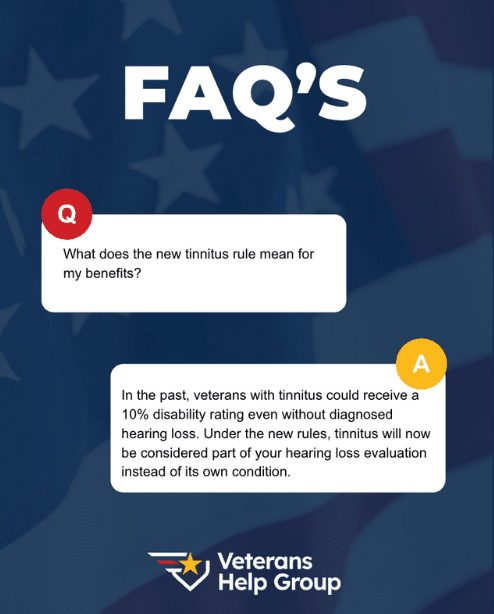How to Qualify for a Tinnitus VA Claim
Military service is a noisy occupation. You are exposed to prolonged gunfire, loud blasts, or spend time in or around noisy, heavy equipment. The prolonged exposure to such loud noises makes tinnitus a leading cause of hearing disability among veterans. Currently, nearly a million veterans suffer from this hearing affliction characterized by continuous ringing, roaring, or buzzing in the ears. Filing a tinnitus VA claim can help you deal with this annoying, stress-inducing disability. When untreated, tinnitus can lead to severe health complications and diminish the quality of life.
What Is Tinnitus?
Tinnitus is a condition that causes one to hear ringing, buzzing, roaring, or high-pitched whistling sounds inside their ears, even if there’s no external noise. The intensity of these sounds varies significantly, and the condition may affect one or both of your ears. Tinnitus isn’t a disease but a symptom of another health condition. Persistent noise in your ears signifies the presence of auditory or ear damage.
Tinnitus symptoms are often more pronounced when you lie down to sleep because it’s quieter. Since veterans on active duty operate in a noisy environment, it may take a while to notice the symptoms. That’s why most veterans notice the problem after leaving the service.
What Causes Tinnitus?
The ringing in your ears may result from a myriad of reasons. Some of the leading causes include:
- Exposure to loud noises: Exposure to loud noise is the primary cause of tinnitus in veterans who’ve spent time in an extremely noisy environment. Operating heavy machinery, training on the weapon range, and conducting aircraft operations may lead to tinnitus. Wearing hearing protection is helpful but doesn’t eliminate the risks.
- Head Trauma: Veterans caught in an IED blast often suffer from traumatic brain injury (TBI). Temporary or chronic tinnitus is a common secondary condition for veterans suffering from TBI.
- Inner ear pressure changes: Experiencing percussive explosions may cause TBI and severely distort the pressure in the ear. Activities such as swimming, flying, and diving may lead to pressure changes. Other leading causes include sinus infections, circulatory system problems, and the common cold.
- Underlying health conditions: Tinnitus often occurs alongside hearing loss, indicating that the conditions leading to hearing loss may lead to tinnitus. Meniere’s disease, peripheral vestibular disorder, and circulatory problems in the ears may lead to tinnitus. Mental health problems such as anxiety and depression may also lead to ringing in the ears.
- Old age: Hearing senses decline with age, and tinnitus may be part of the age-related hearing loss.
Is Tinnitus Curable?
Tinnitus has no known cure, and you can only manage the symptoms. Sometimes the condition is temporary, and it goes away after a while. However, chronic tinnitus doesn’t go away and requires active management. It takes the combination of several treatment options to ease the symptoms of chronic tinnitus.
Various treatment options can help you manage the symptoms. Most options help by lowering the ringing and other noises to manageable levels or alleviating them completely. Popular tinnitus treatment options include:
- White noise machines: They produce white noise to mask the ringing in the ears.
- Hearing aids: They improve hearing and reduce the ringing in the ears.
- Masking devices: White noise devices that resemble hearing aids and are worn inside the ear.
- Antidepressants: Some antidepressant drugs help reduce the ringing noises.
- Acupuncture: Manipulating pressure points in the body helps to alleviate tinnitus symptoms.
- Dietary changes: Reducing alcohol, nicotine, and caffeine helps manage the symptoms.
- Stress management: effective stress management helps relieve tinnitus symptoms
Try a combination of treatments to see what works best for you. Since tinnitus is often a secondary symptom, treating the primary illness cures the condition.

Does VA Consider Tinnitus a Permanent Disability?
You’ll need to undergo a C&P exam to verify a tinnitus diagnosis when filing a VA claim for disability. The test comprises a speech recognition test and a pure tone audiogram. If your test results indicate a tinnitus diagnosis, you become eligible for VA disability.
However, the VA doesn’t consider tinnitus a permanent disability because sometimes the condition is secondary. The agency conducts reevaluations to track disability progression. The reevaluations happen six months after discharge or 2-3 years after awarding you a VA tinnitus disability. You’ll receive a notice of the pending disability reevaluation and undergo the required examinations.
Making a Tinnitus Claim to the VA
Tinnitus is the most common disability claim filed by veterans to VA for compensation. Tinnitus can prove crippling because it may lead to sleep disorders, anxiety, and depression. Since the condition is so common, your tinnitus claim will undergo heavy scrutiny.
You should file a tinnitus disability compensation as soon as the symptoms develop. Your tinnitus VA claim should follow the standard disability claim process. Also include detailed records showing you were exposed to excessive noise during your active service. Consulting an expert can help your claim sail through on the first try.
The VA assigns tinnitus a maximum disability rating of 10%, whether it affects one or both ears. If you suffer from tinnitus and hearing loss, you should include hearing loss as a different condition in the VA claim.
Sometimes, you may develop tinnitus symptoms after an active duty discharge. Fortunately, you may file a tinnitus claim with the VA after leaving the service. When applying for disability tinnitus, you should provide a statement of the condition and a connection to noise exposure during your service. A medical diagnosis of the condition may be necessary.
Establishing a Service Connection for Tinnitus
Eligibility for a VA tinnitus claim requires you to establish a service connection. A service connection demonstrates you developed tinnitus due to an in-service injury, event, or illness. Failure to present enough evidence to establish a service connection may cause the VA to deny your claim.
Some of the evidence to establish service connection for tinnitus include:
- Service records detailing prolonged or regular exposure to loud noises during training or combat.
- Medical records establish that you didn’t have a hearing-related problem before joining the military.
- Lay evidence or buddy statements attesting that your military duties comprised excessive exposure to loud noise environments such as equipment maintenance, munition ranges, or aviation assignments.
- Assignment orders or any service order that demonstrate noise exposure.
Besides establishing a service connection, you must provide medical proof of a current tinnitus diagnosis. The proof may be from a civilian doctor or a military treatment facility.
Lastly, you need a nexus letter, a document from a medical evaluator connecting the in-service noise exposure to the tinnitus diagnosis. A nexus letter is critical to proving service connection when making a VA tinnitus claim.
VA Disability Benefits for Tinnitus
The standard VA rating for recurrent tinnitus is 10%, whether the condition affects one or both ears. As of December 1, 2024, the monthly VA disability compensation for a 10% disability rating is $175.51. This rate is effective through 2025. Veterans eligible for a tinnitus VA claim may use these funds to seek the best treatment options. Working with their physician, they may develop a custom treatment plan. That may include stress management techniques, dietary and lifestyle changes, and white noise machines.
Get Credible Help Filing a VA Tinnitus Claim
With more than 15 years of representing disabled vets, Veteran Help Group has significant experience working with Veterans Affairs. Our experts have in-depth knowledge of the claims requirements and can skillfully help you file your claims. Let us help you get the compensation you need to improve your quality of life.
Call us at 855 855 8992. You can also contact us and get a free case evaluation






